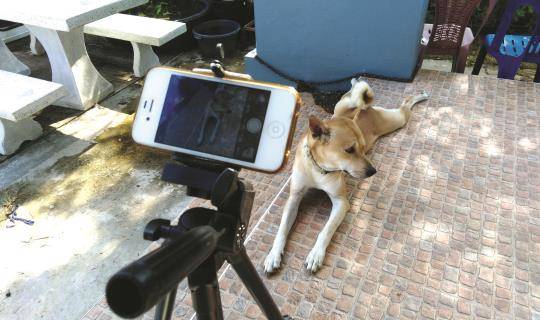Is Podcasting Right for You?
By Roxanne Hawn

Podcasting stats
According to Nielson, which tracks media consumption and demographics:
- 50 percent of U.S. homes listen to podcasts
- 80 percent of individual listeners listen to all or most of each episode they begin
- Slightly more men (56 percent) than women listen to podcasts
- Overall, podcast listeners tend to have higher household incomes (above $75K) and at least a four-year college degree
- Podcast fans also report more activity across all social media channels
Infinite Data reports that 49 percent of podcast fans listen at home and another 22 percent listen in the car. Others tune in at work, while riding public transit, during workouts, etc.
Ask yourself
Before you jump into podcasting, consider these important questions:
Interest? Veteran journalist and host of the Deliberate Freelancer podcast, Melanie Padgett Powers, suggests polling clients via social media or broaching the topic when you see them in person. “Ask if they would be interested in a podcast on veterinary health and what topics they would be most likely to listen to,” she says.
Time? The off-the-cuff sound of many podcasts makes them seem quick and easy, but they take work, sometimes a lot. “One of the first and most important questions would be, ‘Do we have the time?’” says Mia Horberg, who co-hosts Paws & Play (with Dr. J) for PreventiveVet.com. “Podcasts might seem like a super easy and quick content piece to produce, but it actually takes a lot of time to plan, set up, record, edit and promote. If time is not something you have a lot of, and extra time is not something you’re willing to give, a podcast is likely not something you’d want to dive into.”
Powers agrees, “It usually takes me 3–4 hours to create a 20–30-minute episode. That includes doing the research and scripting it out, plus recording and listening to the playback, and promoting on social media. That doesn’t include editing because I hire an audio editor.”
"I think there’s room for all types of veterinary practices to have a podcast, but the ones that will succeed will be coming from a unique perspective or covering topics that aren’t being covered elsewhere."
Perspective? Horberg says, “I think there’s room for all types of veterinary practices to have a podcast, but the ones that will succeed will be coming from a unique perspective or covering topics that aren’t being covered elsewhere. Niche clinics may benefit from using this medium, but there really are so many factors to consider before taking something like this on.”
Content? Horberg points out that personality will only take you so far if you cannot convey educational information or other content well, if that’s your goal. If you use too many medical terms, without adequately explaining them or couching them in ways that people can understand, then it won’t work. Horberg describes the goal as making the information friendlier, “maybe even kid-friendly.”
Goals? “I think pretty much a podcast is really a tool to promote what it is you’re doing,” Iannucci explains. For example, her travel podcast drives traffic to her website and promotes her travel books. Later, she plans to launch a travel magazine.
Iannucci also has had success getting paying sponsors so that the podcasts themselves create an additional income stream. She sent out her first sales pitch email to 200 travel agents at 2 pm on a Sunday afternoon. “I am not joking,” she says, “by 7 o’clock that night, I had three seasons of 12 episodes apiece fully sponsored. I was literally crying because I was like, ‘How did this work?’”
Most podcasts conclude with some sort of call to action that supports your primary business. Powers says, “Like any kind of content marketing, it’s important to focus on storytelling. You don’t simply want to market your services, and I don’t think a straightforward educational presentation about a particular pet condition would be that interesting. People love their pets, and a good vet podcast would tie into that, providing important tips for pet owners, connecting with their love of their animals, providing them reassurance and education in a caring, informative way.”
Dos and don’ts
If you decide that a podcast matches your personality and practice goals, here are some tips.
Do set a schedule and be consistent. “If you’re supposed to be a monthly podcast, be a monthly podcast,” says Iannucci. “If you’re supposed to be a weekly podcast, don’t be a monthly podcast.”
To give herself built-in breaks, Iannucci divides her movie and TV travels podcast into seasons, like TV shows have seasons. Perhaps there are other natural breaks in the veterinary world or your clients’ lives that relieve some of the pressure to podcast year-round.
Do choose a length that works. Some podcasts last just 15 minutes. Others shoot for 45–60 minutes. Horberg says, “Whatever you do, make sure you’re doing it justice without leaving a lot out or repeating yourself a bunch of times.”
Do have a plan. Powers explains that few people can speak off the cuff and still sound professional. If you need a script, use a script. If you can work from an outline, then do that, but have a plan.
Do hire pros as needed. You’ll likely need help choosing equipment like microphones or choosing your podcast platform hosting service and probably even audio editing, if your podcast needs more than an intro and ending tacked onto each episode.
Horberg explains that podcast hosting platforms typically charge a monthly fee to store your recordings and provide ways to connect to streaming services such as iHeartRadio, iTunes and Stitcher. She adds that many newer computers come with podcasting software included. Otherwise, she says, reasonable microphones and podcasting kits start in the $35–$100 range.
Don’t accept poor audio quality. You do not want it to sound like every frustrating mobile phone call you’ve ever had.
Don’t go live, especially with guests. While podcasts are meant to sound live, Iannucci learned the hard way that podcast guests often do not call into live shows as planned, which left her with a lot of time to fill and no guest. So, now she records everything in advance, then she pushes the episode live at the appointed time.
Don’t fizzle out right away. Horberg suggests recording several episodes before you promote and launch so that you don’t risk getting one done then falling flat right away. If you choose to do seasons, as Iannucci has done, you may even want to record an entire season before promoting and launching.
Generational strengths
Veterinarians who grew up in an always-on media and social media culture may feel more comfortable as podcast hosts because they are more accustomed to broadcasting their lives. Even people who are natural introverts, as many veterinary professionals are, do well with podcasting because it’s a self-contained form of interaction.
So, you don’t need to be a screaming extrovert or an aspiring actor to take on podcasting. You do need, though, to feel passionate about your purpose and topics.
For most practices, a podcast may not be the right choice, but for the small percentage of practices that use the medium effectively, it could be a real jump in client communication, education and community building.




